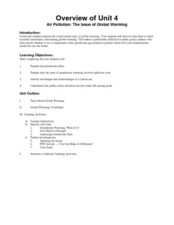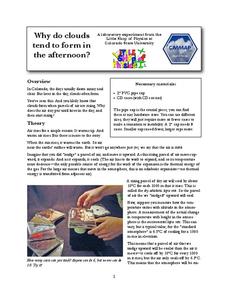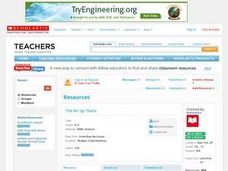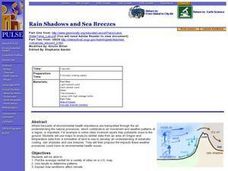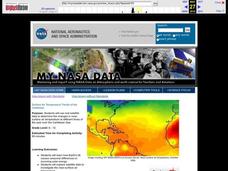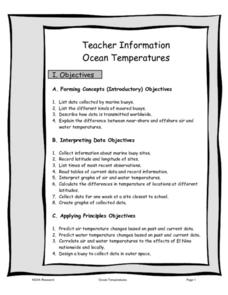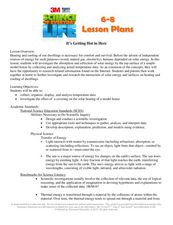Curated OER
Air Pollution: The Issue of Global Warming
Here is an outstanding 10-page lesson plan on global warming. Learners discover that there is a lot of controversy surrounding this topic in that the science behind global warming is difficult to prove. The best thing about this plan is...
Colorado State University
Why Do Clouds Form in the Afternoon?
The stability of the atmosphere changes on a daily basis. A kinesthetic lesson models how the stability of the air changes as it's warmed by the sun. Learners connect their models to the changing air currents and movement of warm and...
Curated OER
Radiation Comparison Before and After 9-11
Using the NASA website, class members try to determine if changes could be detected in cloud cover, temperature, and/or radiation measurements due to the lack of contrails that resulted from the halt in air traffic after the attacks...
Curated OER
Turning the Air Upside Down
Students analyze how engineers study temperature inversions and convection currents to understand why pollution levels may be higher in some areas than others. They participate in an experiment that allows them to build simple models to...
Baylor College
Moving Air
In lab groups, young scientists place aluminum cans with a bubble-solution cap into different temperatures of water to see what size of bubble dome forms. As part of an atmosphere unit in preparation for learning about convection...
Curated OER
Ocean Currents
Students examine ocean currents. In this investigative lesson plan, students examine ocean currents and the relationship between the ocean, our atmosphere, and the weather. They will create a model of an ocean current.
Curated OER
Is Grandpa Right, Were Winters Colder When He Was a Boy?
Students compare current weather data to historic data to see if there is a temperature change. In this weather lesson students complete a lab activity and determine average changes in temperature, precipitation and cloud cover.
Curated OER
The Air Up There
Students observe the weather over a period of two weeks. They gather local weather data and calculate the mean and average figures from the data. They prepare a graph with their observations.
Colorado State University
Can Gravity Push Something Up?
How does a hot air balloon fly? An experimental lesson has scholars build a balloon from a garbage bag and monitor the movement of air. As the temperature of the air in the balloon increases, gravity moves the denser cool air down,...
Curated OER
Rain Shadows and Sea Breezes
Students plot the average rainfall for a variety of cities in the United States. Using the map, they work together to determine patterns on which toxicants are transported through the air. They determine the impacts of various weather...
Curated OER
Demonstration of Factors Affecting Soil Temperature
Students examine the influences of water and mulch on soil temperature. In this investigative activity students complete a soil experiment.
NOAA
Climographs
In the second lesson plan of a five-part series, young climatologists use provided temperature and precipitation data to create climographs of three different cities. They then analyze these climographs to develop a general...
Curated OER
Is Air a Fluid?
Students discuss the physical properties of fluids and then demonstrate that air carbon dioxide and oxygen) is a fluid by creating currents.
Discover Earth
Weather Stations
Transform your classroom into a fully functioning weather station with this series of hands-on investigations. Covering the topics of temperature, precipitation, wind patterns, and cloud formation, these activities engage young...
Curated OER
Investigating Convection Currents
Students examine how differences in the temperature and salinity of the water help create ocean currents. They perform an experiment which shows how temperature affects the circulation of ocean water.
Curated OER
Weather Forecasting
Fourth graders explore the concepts of weather forecasting. Students locate the current weather in a specified city. In groups, they record the specified weather information and make predictions of weather. Students justify their...
Curated OER
Density and Convection Currents
Learners listen as the teacher explains convection currents in the ocean. They experiment with finding a smoking match in the classroom with their eyes closed. Students discuss what might effect their ability to pinpoint the smoke...
Curated OER
Indoor Air Quality
Students examine the role of pollution indoors rather than outdoors. They identify pollutant sources and complete a KWL chart. They also measure pollutant levels and discuss how they can improve air quality.
Curated OER
Temperature Changes: Atmosphere & Ocean
Young scholars observe temperature differences of water and air in sunlight and darkness. They determine that the sun warms the Earth's surface, which controls global currents and climate, keeping the earth habitable. They discover water...
Curated OER
Surface Air Temperature Trends of the Caribbean
Students investigate the seasonal changes to sea surface and near-surface air temperatures near the equator. They use actual satellite data to track and graph the differences in air and sea temperatures during different seasons in the...
Curated OER
What's the Connection Between Convection and Inversion?
Ninth graders observe a simulation demonstrating the difference between convection and inversion. They explain where and when convection and inversion layers occur and how each impacts air quality, and by connection, human health.
Curated OER
Lake Effect
Fourth graders explore some of the effects Great Salt Lake has on Utah's local weather/temperature moderation, lake effect storms, and temperature inversions. They observe the differences of specific heat between soil and water and...
Curated OER
Ocean Temperatures
Pupils list data collected by marine buoys and the different kinds of moored buoys. They describe how data is transmitted worldwide. They explain the difference between near shore and offshore air and water temperatures.
Curated OER
It's Getting Hot in Here
Discover the environmental and economic impact of global warming. After reading an article, emerging environmentalists identify how different countries are responding to the Kyoto Protocol. They research emission laws and write a news...
